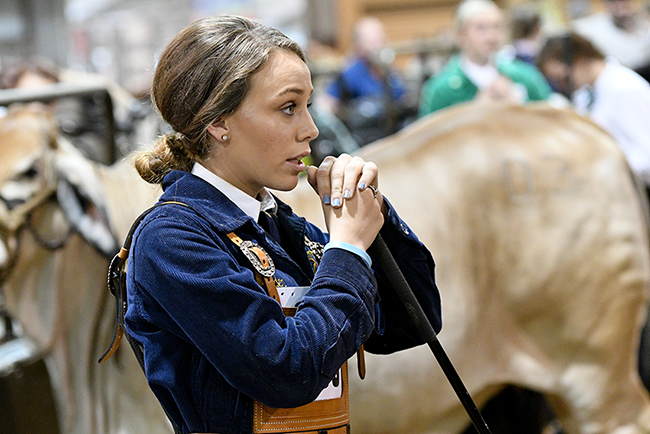Friendships can be Formed, Lessons Learned and Time Management Skills Developed with Fair Experiences
by MARY TOOTHMAN
To fair visitors, it may be all about the yummy food, petting animals, and viewing the neat displays. However, behind the scenes, fair days and showing animals can be a lot of work and a way for youth to learn how to juggle schedules and make adjustments.
Reanna Brown, a Dundee Middle School student, says it’s not easy, but it’s worth it. “In the end, it’s very rewarding to go to these shows. You learn a lot of life skills, like leadership and raising a calf or pig. And seeing that work pay off is worth all of the time and effort you spent preparing.”
It’s clear there are many ways to help put your best foot forward when fair days roll around. We checked in with Brown and a few others experienced in “fair survival” to get their best ideas on having a positive experience.
We asked Brown for some more practical pointers:
What about food? “For breakfast — if you have time to eat — things like granola bars, fruit, and dry cereal. For lunch, sandwiches. If the show is near a Publix, Publix fried chicken is always a good choice. For dinner, usually on the way home or on the way to the hotel, stop at a fast-food restaurant. They are everywhere,” she says.
Chips, crackers, and other non-perishable goods for snacks are always a good idea, too, she says.
And clothing? “Don’t wear your favorite clothes in the barn, you are bound to get dirty,” says this veteran. “Old and comfortable clothes are a must. For shoes, you are walking almost constantly. You will need comfortable shoes, such as boots. When you are washing your animals, use rubber boots so you are not walking around with wet socks or shoes for the rest of the day.”
“At shows, in the time you are not cleaning up manure or preparing cows for shows, have lots of games on your phone that do not require Wi-Fi, or have lots of data. If you are at a fair, then maybe if everything is taken care of you can go out for an hour and enjoy the fair.”
Jessie Bennett, 13, is a homeschooled student who travels showing purebred Brahman cattle. She has some heartfelt advice for positive fair time. “Making friends is the best way to pass the time at the fairs,” she says.
“Here are some ways you can make friends: Help clean up bedding, help load and unload cattle and tools, help groom cattle. If needed, you can offer to help show cattle when someone has too many entries in a class.”
The experience of bonding with others can prove to have a very positive impact. “Making friends at fairs will build opportunities to make life-long friends,” she says. “You will likely keep in touch with your ‘show friends’ for the rest of your life, which is totally invaluable.”
It’s also a great thing to play nice. “Two of the most important things to keep in mind is being a good sport and being kind,” she says. “You always need to celebrate with others when they win.”
Another idea is to get involved by volunteering, she says. “For example, help at check-in, help in the ring, help at weigh-in and help with line-up. You can do all of these things by simply offering to do them,” she says.
Jennifer Williams, a show mom with plenty of fair day notches on her belt, offered us the parental view of fair survival.
“There are so many things that you need for show season to make you’re fair successful, aside from the basics, like rope halters, show halters, show sticks, brushes, combs, and feed pans,” she says.
Being well-prepared is always wise. “One thing that you cannot do without is plenty of feed and hay … because you never know when something is going to happen and your hay is going to get wet, or your feed is going to get ripped, and then you’re stuck two hours away from your feed store and nobody in the area sells the food that your cows are used to eating.”
And while it’s great to be well-stocked, there’s one plus for fair days that money can’t buy. “The most important thing that’s helped us have such successful show seasons is a support system,” Williams says. “I am very, very lucky to have such amazing people around me. Between my Mom and my daughter, and my son-in-law, the parents of the children that show with my niece and nephew — they are the reason why we have been able to travel across the state and show cattle at all these fairs and all these livestock shows.”
“When we first started showing cows, we didn’t have such a strong support system and it was difficult … Over the years, I have been very lucky to meet tons of people that have taught us lots and lots of stuff that we need to know to become successful.”
“Now that my kids are grown, and we are starting on our second generation of showing, it’s important to me that we give that back.”
She says she strives to pass this message on to young people. “Helping out your neighbor is one of the most important things you can do at the cow show. Ribbons fade, and trophies get dusty — but you’ll never, ever forget the memories or the friends you made.”

